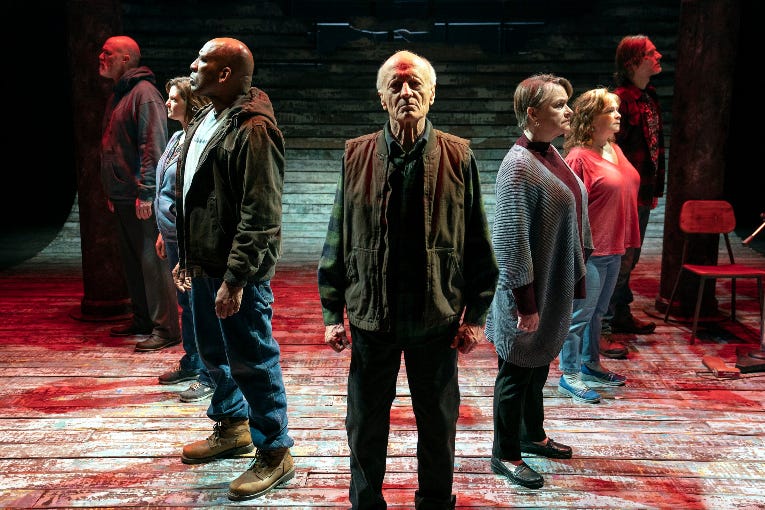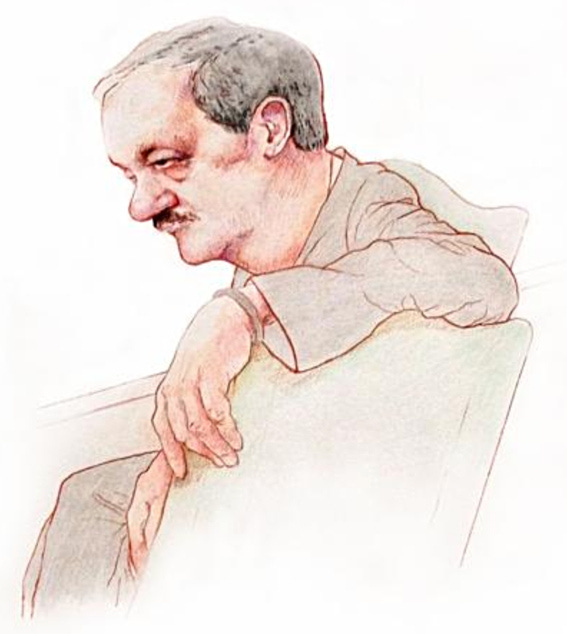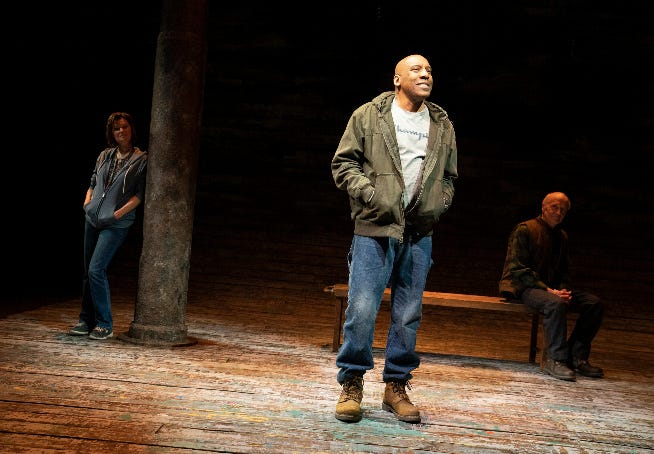It Wasn't Just a 'Disaster'
"Coal County" makes its way Off-Broadway to fire up a West Virginia stage | May13.2022
GREETINGS. This is a special issue of WestVirginiaVille’s newsletter, featuring an excerpt from my review of a remarkable piece of theater Monday, May 9, in Beckley WV. The riveting testimony and the affecting tunes by Grammy-winning Steve Earle in “Coal Country” were well-received “Off Broadway,” but bringing this unflinching production about the 29 lives lost in the 2010 Upper Big Branch mine disaster to West Virginia raised all sorts of stakes.
THESE ARE EXCERPTS BELOW. SEE THE FULL REVIEW with more photos: westvirginiaville.com/2022/05/coal-country-the-review/
The heart-rending and oligarchic view from ‘Coal Country’
By Douglas John Imbrogno | Editor, WestVirginiaVille.com
“Coal Country” was initially staged at New York’s Pubic Theater. The May 9, 2022 staging in Beckley WV, just 35 miles from the site of the Upper Big Branch mine disaster was its first-ever West Virginia performance. PHOTO by Joan Marcus, courtesy The Public Theater.
I wasn’t planning to review “Coal Country” after heading this week to Beckley, WV, part of a pilgrimage of nearly a thousand people given free tickets to a one-night show, hosted May 9, 2022, by Audible Theater and Theater West Virginia. Yet in the vast Woodrow Wilson High School auditorium that night, my immediate physical and emotional response was profound:
Tears wetting my cheeks halfway through the 90-minute production. Hearing Grammy-winning Texas troubadour Steve Earle perform his gutting, original songs written for the play. Feeling long-smoldering embers of outrage, stoked again into a bonfire by tales of the cold-blooded handiwork of Don Blankenship, the Snidely Whiplash of the West Virginia coalfields.
The play’s anguish—and its significance—is the cry-from-the-heart testimony of survivors and families of 29 miners lost in the Upper Big Branch mine disaster in Montcoal, WV, on April 5, 2010.
To give an accurate accounting, husband-and-wife playwrights Jessica Blank and Erik Jensen traveled to the region with Earle to interview survivors and the families of those lost in the conflagration. They recorded more than 40 hours of conversations with more than a dozen people.
After four years of workshopping the script, they burned the interviews down into an absorbing 90-minute production, in the crucible of the “documentary theater” style first seen in their award-winning docudrama “The Exonerated” (which also featured Earle).
As a result, 95 percent of the words heard in “Coal Country” come from interviews, a direct hit from the heart-shredding experience of survivors and families, while Blank and Jensen have said the rest are true to what their subjects intended.
On stage, Earle serves as a sort of Greek Chorus with guitar and banjo, performing solo or with the actors seven songs he wrote for the production, along with his song “The Mountain.” (Hear them performed with his band The Dukes on his 2020 album “Ghosts of West Virginia”).
It’s a match made in heaven for an event straight out of hell.
Steve Earle’s songs for “Coal Country” function as commentary, prayer, and coda. Photo by Joan Marcus, courtesy The Public Theater.
‘Production over safety’
I was a staff writer at the time for the state’s leading newspaper, The Charleston Gazette, and we covered the heck out of the Upper Big Branch disaster, led by our investigative reporter Ken Ward Jr.
Yet these many years later, “Coal Country” lands with the force of a revelation, or maybe a gut-punch, in spotlighting a deeply personal look at the human toll taken—fathers, sons, uncles, nephews and granddads—when an explosion tore through the deep chambers of the mine at about 3:30 p.m. that day.
Upper Big Branch was the deadliest American mine disaster in nearly 50 years, and it was a non-discriminating calamity. The youngest victim, Cory Davis, was 20-years-old, while the oldest, Benny Willingham, was 62. To call Upper Big Branch a mere “disaster” is to willfully ignore the callous, inhumane corporate overlords responsible for these deaths, and the blood still dripping from their hands.
In a December 2011 report, the federal Mine Safety and Health Administration found that the immediate cause was a methane ignition that set off flammable coal dust. And why was that? The report blamed the “unlawful policies and practices” of then-mine owner Massey Energy Co., which it said “promoted and enforced a workplace culture that valued production over safety.”
Massey kept two sets of books to mislead federal inspectors and its own workers about hazards in the mine, which had twice as many accidents as it reported to regulators, the MSHA report concluded. The company also failed to conduct adequate inspections, intimidated workers to prevent them from reporting violations, and tipped off crews to surprise inspections, the report found.
Again, why was that?
‘Tell us what’s up as you walk by …’
As head honcho and reigning Massey oligarch, Don Blankenship asked for production reports from the mine every half hour, including weekends. And no wonder. Blankenship doubtless thrilled at seeing his bank account bump upward with each report. His compensation was tied to production, and each day the mine yielded more than $500,000 worth of top-quality coal from a deep hole in the Raleigh County hills, according to testimony.
Performance Coal, the subsidiary of Massey that ran Upper Big Branch, was created specifically to run a non-union operation without the mine workers’ union raising annoying, profit-hindering concerns. (Union mines are safer, wrote Phil Smith of the United Mineworkers of America at the time of Upper Big Branch, “because workers elect their own safety committees and they know they can report hazards without fear of retribution.”)
Massey intimidated workers to stymie them from reporting violations, a fact known to inspectors. Here is what one “Coal Country” character reports hearing from a mine inspector:
“You don’t even need to be seen in an interview with us, just tell us what’s up as you walk by …”
Managers brought in seasoned union miners like Gary Quarles for their coal mining know-how, but downplayed or flat-out ignored their hard-earned, decades-long wisdom on how to run a safe mine. Quarles recalls in the play that when he first began working in the mine, he couldn’t believe how management shouted at miners.
Experienced miners felt something terrible was in the wings. One of them in the play, nicknamed Goose, who serves as a sort of wry, truth-telling soothsayer, reports to his wife, Mindi, that the mine was “a ticking time bomb.”
The fellowship of workers
And so it was. The fuse was lit directly by human hands and a corporate culture that prized profits over concerns about the literal lives of its employees. The toll remains devastating. The free tickets for “Coal Country” arrived via e-mail with this warning:
“‘Coal Country” is intended for mature audiences only, dealing with themes of death and loss in the local area, and contains harsh language. There is also one graphic but respectful description of human remains in the story taken directly from a family member’s testimony that may be upsetting to some attendees …”
That scene—the sister of a dead miner demanding to see the shocking partial remains of her brother in a morgue and then crying out “Where is his head?!?”—brought audible gasps from the audience. More than once, as survivors and family cycle on stage in anguish, rage and dumbfounded devastation, you could hear a pin drop in the big hall, but for quiet sniffles and throttled exclamations.
The smallest details ring out the loudest. A miner’s wife, Patti (Mary Bacon), laments how she got less than five years with her husband and they were the happiest of her life, she says. In the shattering days after he was lost underground she slept with his clothes to have his scent close by.
I learned later from an acquaintance at Theater West Virginia that not all the seats were filled from a block set aside for survivors and family members, as he said: “Some of the family members just couldn’t make it, emotionally …”
This is not an easy play to sit through at times, and much less so for family who lived its story and losses.
…
‘Profit uber alles’
Mary Bacon as the coal miner’s wife, Patty. Her husbands’ clothes was all she had left of him . Photo by Joan Marcus, courtesy The Public Theater.
“Coal Country” needs to be heard, literally and figuratively. It is a significant piece of documentary theater. But it is also a cogent, compelling piece of American history. And of labor history.
In its own fashion, “Coal Country” is a hard-hitting critique of predatory capitalism. After all the money in the bank and the blood on the ground, what did Massey Energy and Don Blankenship’s pursuit of profit uber alles represent apart from heartless predators hunting for dollars, and damn the human consequences?
The play is also a pretty accomplished, non-caricatured presentation of heartfelt West Virginia voices and accents, always a tricky thing on the national stage. When I walked in—not having read up on the play yet—I initially wondered if they’d cast West Virginian actors. But these are all consummate New York stage and screen veterans.
“Coal Country” opened at the Public Theater in New York in 2020 and ran for just 26 performances before the COVID pandemic shut down theaters in March of that year. It was revived this year with a limited off-Broadway run through mid-April at the Cherry Lane Theater. Monday’s showing was its first presentation in the hills where this tragedy directly hollowed out families and walloped communities. (The site of the mine disaster was about 35 miles from the theater.)
In interviews, Earle has said that the West Virginians interviewed by playwrights Blank and Jensen had a major initial concern: “‘Those people’—talking about a theater audience in New York—’are gonna think we’re stupid,’” Earle recalled.
From the evidence of its reception that has not happened. The play has won plaudits from big city theatergoers and critics alike, connecting with real stories of actual people, Earle told an interviewer. “They’re just in West Virginia. And the thing I’m proudest of is I’m watching these audiences empathize with these people that otherwise I don’t think they would ever be able to relate to.”
…
I urge some well-heeled or philanthropic folks in the arts to pull together a production to tour small halls across West Virginia and Appalachia, showcasing it at regional events such as FestivALL Charleston in West Virginia’s capital.
I might also suggest the playwrights consider making the play available for community theaters and school productions. Off-Broadway plaudits and awards are cool, but I cannot think of a more incendiary bit of guerrilla theater than to see “Coal Country” staged locally across the region (with all due respect to the challenge of walking back the play’s unfiltered coarse language, so maybe that’s a dream too far.)
The next time bomb
Finally, the word “oligarch” is much in the news these days as yet another amoral white man in an expensive suit—this one named Vladimir—bankrolls the murderous mugging of a neighboring country and the repression of his own with an autocracy funded by unbounded oligarchic wealth.
You might think it excessive to put a pathetic little big man like Don Blankenship in the same league as world-historic bad guys like Vladimir Putin, but an oligarch is an oligarch. The principle holds—unfathomable wealth creates mega-powerful companies and institutions that steamroll human lives, whether in Moscow or the Appalachian outback.
“Coal Country” is a prime example of how creativity and well-crafted cultural output, in this case a stripped-down play that pops up off-Broadway one day, can speak truth to power through the power of story.
Earle noted in one interview that the Upper Big Branch disaster “made the national news for about 30 seconds,” and then dropped into the memory hole in the onrushing flood of headlines. “Coal Country” returns this mine disaster to center stage.
And that’s good, because we are not done with this story.
Don Blankenship’s conduct as Massey Energy’s predator-in-chief was so deplorable that he was the first coal operator ever put in a cell for a mine disaster (which itself is its own indictment). He was found guilty of conspiring to willfully violate mine safety and health standards, which helped to fuel a death-by-inferno tragedy that killed 29 human beings.
He was then given—wait for it—a 12-month sentence. (Applause and huzzahs erupted when Blankenship got his comeuppance in the West Virginia production, and almost a hiss when the sentence was announced.) This slap on his wrist was a face slap to Upper Big Branch families and survivors.
But Donald had further acts up his sleeve. Post-prison, the Upper Big Branch community and much of West Virginia received in the mail a glossy booklet explaining how he really, really wasn’t really guilty. The big, bad thing that happened was really the government’s fault. The pièce de résistance to this shameless song and dance was him footing the bill for the release of this booklet from his ill-earned Massey wealth — and its title, “An American Political Prisoner.” He also ran for president in one of history’s more hapless presidential campaigns in, like, ever.
Our lessons become the morals of our stories, and so long as “Coal Country” has an afterlife—after off-Broadway and after Monday’s West Virginia premiere—that is a very good thing. Let us all support that happening.
Because the fact of the matter is this: Wherever predatory capitalism, unrestricted oligarchs, and amoral national political parties laser-focused on erasing all protections for common, working folk continue to control and ravage the plains of American life, other “ticking time bombs” will go off.
The only question is where.
“Coal Country” is a lament and a powerful homage. It’s also a warning shot across the bow of every American community.
P.S.: The Faces
The play "Coal Country" lifts up the words of survivors and family members. Below are the faces of the actual men who died that April day in 2010, from a video I crafted as part of the Charleston Gazette's coverage of the explosion's terrible aftermath.









Well done, Doug. Thanks for sharing!